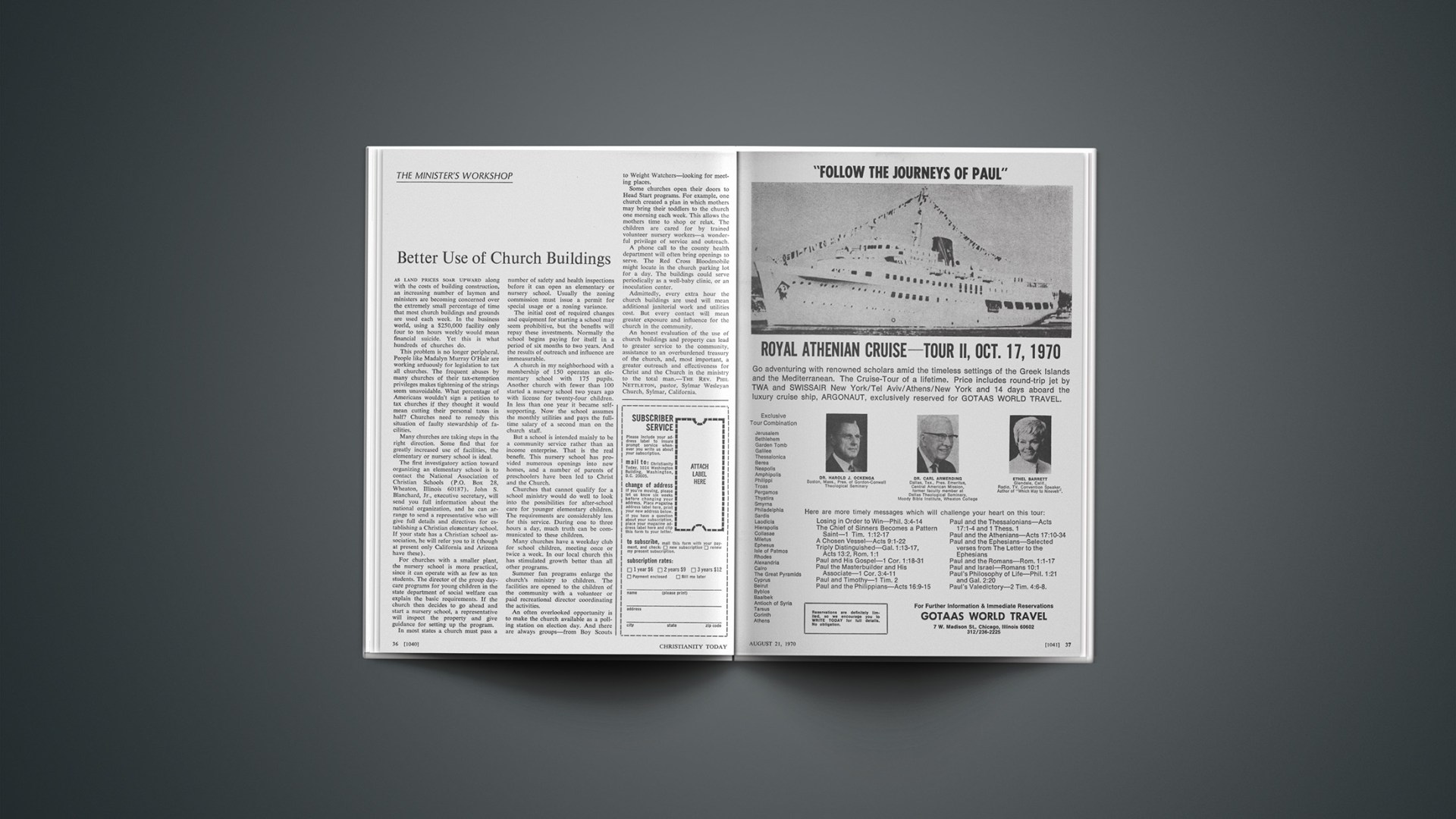As land prices soar upward along with the costs of building construction, an increasing number of laymen and ministers are becoming concerned over the extremely small percentage of time that most church buildings and grounds are used each week. In the business world, using a $250,000 facility only four to ten hours weekly would mean financial suicide. Yet this is what hundreds of churches do.
This problem is no longer peripheral. People like Madalyn Murray O’Hair are working arduously for legislation to tax all churches. The frequent abuses by many churches of their tax-exemption privileges makes tightening of the strings seem unavoidable. What percentage of Americans wouldn’t sign a petition to tax churches if they thought it would mean cutting their personal taxes in half? Churches need to remedy this situation of faulty stewardship of facilities.
Many churches are taking steps in the right direction. Some find that for greatly increased use of facilities, the elementary or nursery school is ideal.
The first investigatory action toward organizing an elementary school is to contact the National Association of Christian Schools (P.O. Box 28, Wheaton, Illinois 60187). John S. Blanchard, Jr., executive secretary, will send you full information about the national organization, and he can arrange to send a representative who will give full details and directives for establishing a Christian elementary school. If your state has a Christian school association, he will refer you to it (though at present only California and Arizona have these).
For churches with a smaller plant, the nursery school is more practical, since it can operate with as few as ten students. The director of the group day-care programs for young children in the state department of social welfare can explain the basic requirements. If the church then decides to go ahead and start a nursery school, a representative will inspect the property and give guidance for setting up the program.
In most states a church must pass a number of safety and health inspections before it can open an elementary or nursery school. Usually the zoning commission must issue a permit for special usage or a zoning variance.
The initial cost of required changes and equipment for starting a school may seem prohibitive, but the benefits will repay these investments. Normally the school begins paying for itself in a period of six months to two years. And the results of outreach and influence are immeasurable.
A church in my neighborhood with a membership of 150 operates an elementary school with 175 pupils. Another church with fewer than 100 started a nursery school two years ago with license for twenty-four children. In less than one year it became self-supporting. Now the school assumes the monthly utilities and pays the full-time salary of a second man on the church staff.
But a school is intended mainly to be a community service rather than an income enterprise. That is the real benefit. This nursery school has provided numerous openings into new homes, and a number of parents of preschoolers have been led to Christ and the Church.
Churches that cannot qualify for a school ministry would do well to look into the possibilities for after-school care for younger elementary children. The requirements are considerably less for this service. During one to three hours a day, much truth can be communicated to these children.
Many churches have a weekday club for school children, meeting once or twice a week. In our local church this has stimulated growth better than all other programs.
Summer fun programs enlarge the church’s ministry to children. The facilities are opened to the children of the community with a volunteer or paid recreational director coordinating the activities.
An often overlooked opportunity is to make the church available as a polling station on election day. And there are always groups—from Boy Scouts to Weight Watchers—looking for meeting places.
Some churches open their doors to Head Start programs. For example, one church created a plan in which mothers may bring their toddlers to the church one morning each week. This allows the mothers time to shop or relax. The children are cared for by trained volunteer nursery workers—a wonderful privilege of service and outreach.
A phone call to the county health department will often bring openings to serve. The Red Cross Bloodmobile might locate in the church parking lot for a day. The buildings could serve periodically as a well-baby clinic, or an inoculation center.
Admittedly, every extra hour the church buildings are used will mean additional janitorial work and utilities cost. But every contact will mean greater exposure and influence for the church in the community.
An honest evaluation of the use of church buildings and property can lead to greater service to the community, assistance to an overburdened treasury of the church, and, most important, a greater outreach and effectiveness for Christ and the Church in the ministry to the total man.—THE REV. PHIL NETTLETON, pastor, Sylmar Wesleyan Church, Sylmar, California.










